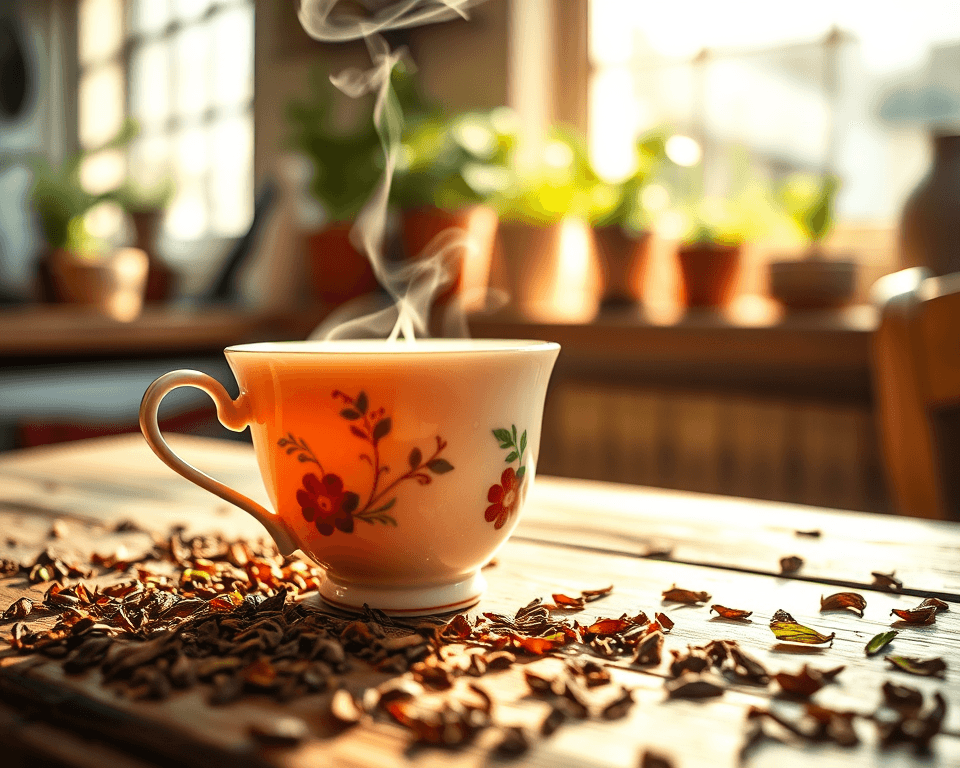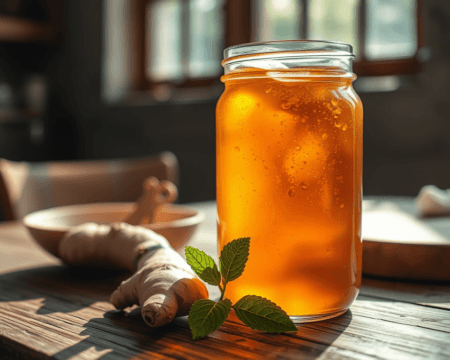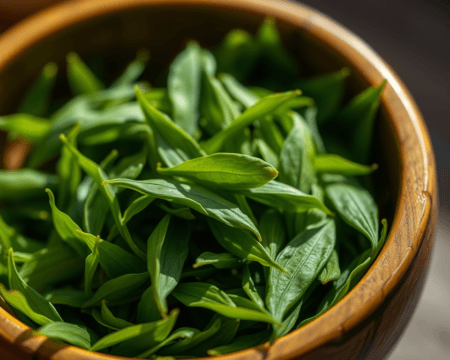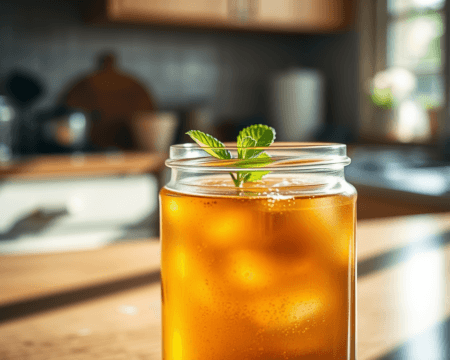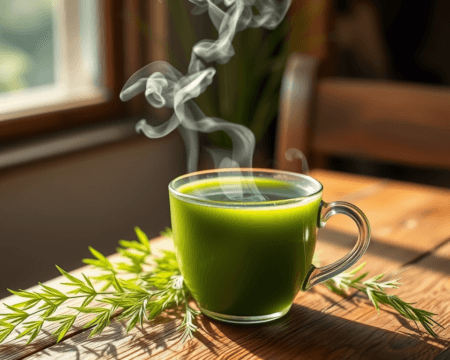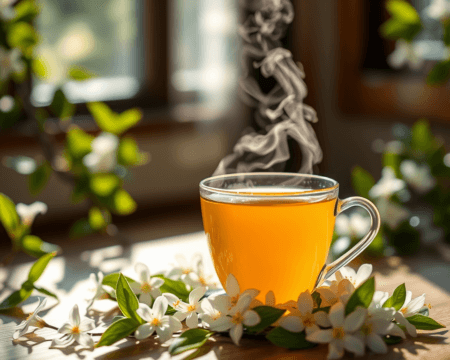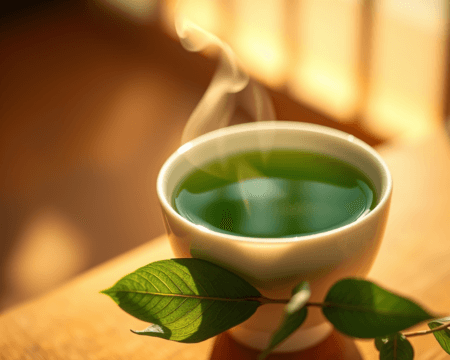When I think about tea, I see it as a ritual—a calm moment amidst the chaos of everyday life. But then there’s decaf tea, which has become a game-changer for folks seeking to cut back on caffeine without sacrificing flavor. It’s that balance between enjoyment and wellness that has made decaf tea a hot topic. So, whether you’re a seasoned tea drinker or someone who’s just starting their journey, understanding what decaf has to offer is essential. Let’s break it down!
Key Takeaways
- Decaf tea retains most of the health benefits of regular tea, thanks to the presence of antioxidants.
- It can improve sleep quality, particularly for those sensitive to caffeine.
- Not all decaf tea is created equal; various decaffeination methods and types exist on the market.
- Awareness of possible drawbacks—like acidity and negative interaction with medications—is vital for making informed choices.
- Popular brands like Twinings, Celestial Seasonings, and Harney & Sons have a range of decaf options worth exploring.
Understanding Decaf Tea: What Is It?
The Decaffeination Process
Let’s start with how decaf tea comes to life. The decaffeination process removes most of the caffeine from tea leaves, typically using one of several methods. The two most common are the carbon dioxide method and the water process. These methods aim to extract caffeine without compromising the tea’s flavor or diminishing its beneficial compounds—especially important for avid health enthusiasts like us!
In the water process, tea leaves are soaked in water, allowing the caffeine to dissolve. The water is then passed through a charcoal filter that traps caffeine but leaves behind the delicious tea flavors and healthy antioxidants, like those powerful polyphenols and flavonoids. On the flip side, the carbon dioxide method uses pressurized carbon dioxide to selectively extract caffeine while preserving the tea’s essential qualities. This method often yields a chemical-free decaf, which is what many consumers want today.
Types of Decaf Tea Available
Now let’s talk varieties! The world of decaf is rich. You’ve got your herbal teas, which are naturally caffeine-free—think chamomile and peppermint! Then, there are traditional tea types that do offer decaffeination, like green tea, black tea, white tea, and oolong tea. Each comes with its unique flavor profiles, making it easy to find something that suits your taste.
Brands like Twinings, Celestial Seasonings, and Harney & Sons have jumped headfirst into the decaf game, each offering a range of delicious options. Whether you’re going for their classic Earl Grey decaf or a fruity herbal blend, the market is brimming with choices. It’s about finding what fits your palate and meets those health certifications, because we need to be picky about our brews!
Health Benefits of Decaf Tea
Antioxidants and Their Role
One of the biggest draws of decaf tea lies in its antioxidants. We’ve all heard that word thrown around, but what does it mean for our bodies? Antioxidants primarily help combat free radicals, those pesky guys that can lead to chronic diseases like heart issues and even cancer. Scientific studies indicate that the antioxidants in tea can aid in supporting our immune systems and preventing chronic disease.
If you’re serious about heart health, decaf green tea in particular has been associated with reducing cholesterol levels and improving blood vessel function. You’re not just drinking a soothing beverage; you’re harnessing the power of health protection in every cup!
Decaf Tea and Sleep Quality
Now, let’s chat about sleep—probably one of my favorite topics, ha! If you’ve ever tossed and turned due to caffeine jitters, you know how crucial it is to find soothing night-time beverages. That’s where decaf tea shines. It offers a relaxing alternative that can actually promote better sleep quality without messing with your melatonin production.
Research on sleep hygiene points to calming effects from herbal teas, like chamomile and peppermint, which can help with insomnia relief. There’s something so comforting about a warm cup of herbal decaf as you wind down. Plus, you don’t have to worry about what time you sip on it!
Hydration and Decaf Tea
Worried about hydration? Let me clear something up: decaf tea can be part of your fluid intake. Contrary to the notion that caffeine leads to dehydration, moderate tea consumption can actually boost your hydration levels. Health guidelines state that beverages like decaf tea count toward your daily fluid intake, contributing positively to your electrolyte balance. So go ahead and sip on that Earl Grey or fruity blend—your body will thank you!
Comparing Decaf Tea with Regular Tea
Nutritional Differences
Now, I know you might be thinking, “What’s the difference between decaf and regular tea?” Well, to put it simply, the nutritional differences boil down to caffeine content. Regular tea can give you that quick lift with caffeine, while decaf offers health benefits without the jitters.
But here’s the kicker: decaf still packs a punch with vitamins and minerals. Decaf varieties retain those beneficial compounds that provide the same health insights. So if you’re cutting down on caffeine but still want to enjoy those health benefits, decaf is your go-to without sacrificing flavor, especially when using quality brewing methods.
Effects on the Body
We can’t forget about how our bodies react to what we consume. Regular tea can give your metabolism a little nudge and even boost your heart rate, thanks to caffeine. But for caffeine-sensitive folks or those looking to curb anxiety, decaf is a blessing. Users often share that going decaf leads to smoother, more stable energy levels without the crash.
It’s fascinating to see how physiological responses can vary. Some folks thrive on caffeine; others benefit from the calm steadiness of decaf. Make sure to listen to your body and adapt to what feels best for you.
Potential Drawbacks of Decaf Tea
Possible Negative Effects
While decaf tea has plenty of perks, it’s essential to address the potential drawbacks. Some tea lovers might notice acidity or even stomach issues from certain types of decaf tea due to their processing methods.
Additionally, some might miss out on caffeine’s perks—like enhanced focus or a slight metabolism boost. Your dental health can also take a hit; while tea can stain teeth, the acidity may contribute to tooth sensitivity. And if you’re on medications, always ensure your decaf choices won’t interfere.
Misconceptions About Decaf Tea
Oh, and let’s clear up a few common myths around decaf tea! A lot of people assume that decaf means “no health benefits,” which couldn’t be further from the truth. In recent marketing tactics, some brands tend to mislead consumers into thinking decaf is less substantial than its caffeinated counterpart.
Educating yourself on decaf tea facts is critical. Remember, just because it’s decaf doesn’t mean it’s lacking in taste or health benefits. Research shows that many decaf teas still provide significant antioxidants, so don’t shy away just because of common misconceptions.
Popular Brands and Varieties of Decaf Tea
Leading Brands and Their Offerings
Now that you’re ready to explore decaf tea, let’s talk about where to get your hands on some! Brands like Twinings, Celestial Seasonings, and Harney & Sons are at the forefront, offering quality decaf options. Twinings’ decaf English Breakfast is a classic go-to, perfect for that morning ritual without the caffeine jitters.
Harney & Sons has a lovely selection of organic decaf teas, like their charming Decaf Earl Grey, which gives you that bergamot infusion without anxiety about nighttime sips. Each of these brands emphasizes quality and flavor, ensuring you get the best of both worlds.
Unique Flavors and Recipes
Experimenting with decaf can be a tasty adventure. Don’t just stick to plain cups; get creative! Try blending fruity decaf options, or whip up iced tea for a refreshing twist.
You can mix decaf green tea with fresh mint and a squeeze of lemon for a banger summer drink, or steep some decaf chamomile with honey and a dash of cinnamon for a relaxing evening delight.
Thinking about hosting friends? Craft a flavorful decaf tea punch! Use several decaf varieties, toss in some fresh fruit, and serve it over ice. Anyone can enjoy a good brew, caffeinated or not!
By now, you’ve got the lowdown on decaf tea and all its intricacies. It’s loaded with health benefits, offers a plethora of choices, and can spice up your daily routine. You’re not just sipping tea; you’re making a conscious, impactful choice for your body and mind!
Frequently Asked Questions
What are the benefits of drinking decaf tea compared to regular tea?
Decaf tea retains many health benefits of regular tea, including antioxidant properties that can support overall wellness. It also promotes hydration without caffeine’s stimulating effects, making it a suitable option for those looking to reduce caffeine intake while enjoying tea’s comforting experience.
Are there any side effects of consuming decaf tea?
While generally safe, decaf tea may cause occasional digestive issues due to its acidity. Additionally, some individuals might experience interactions with certain medications, particularly those affecting the cardiovascular system, so it’s wise to consult a healthcare professional if you have concerns.
How is decaf tea made, and do different methods affect quality?
Decaf tea is made through various methods, including the CO2 method and the water process. Each method differs in how it retains flavor and antioxidants, leading to variations in quality. Researching brands and their decaffeination processes can help you find higher-quality options.
Can decaf tea still help improve sleep quality?
Yes, many people find that drinking decaf tea before bedtime can enhance sleep quality. Its lack of caffeine makes it an ideal bedtime beverage, allowing relaxation without the risk of insomnia that some may experience with caffeinated teas.
Which decaf tea brands are the most popular?
Popular decaf tea brands include Twinings, Celestial Seasonings, Harney & Sons, and Stash. These brands offer a wide range of flavors and types, allowing you to explore various options while enjoying the benefits of decaffeinated tea.
How can I choose a good quality decaf tea?
To choose high-quality decaf tea, look for reputable brands that employ gentle decaffeination methods, such as CO2 or water processing. Reading reviews, checking for certifications, and inspecting the packaging for freshness and ingredient transparency can also guide your choice.
Is decaf tea suitable for everyone?
Decaf tea is generally suitable for most people, including those sensitive to caffeine. However, individuals with certain medical conditions or those taking specific medications should consult their healthcare provider to ensure it’s a safe option for their diet.
Can I drink decaf tea if I have acid reflux?
While decaf tea is less acidic than regular tea, it still may contribute to symptoms in some people with acid reflux. It’s advisable to monitor your body’s response and choose herbal decaf options that are gentler on the stomach.
How should I store decaf tea to maintain its freshness?
To maintain the freshness of decaf tea, store it in a cool, dark place in an airtight container. Keeping it away from light, moisture, and strong odors will help preserve its flavor and beneficial properties for longer periods.




